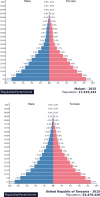Creating Evidence-Based Youth Mental Health Policy in Sub-Saharan Africa: A Description of the Integrated Approach to Addressing the Issue of Youth Depression in Malawi and Tanzania
- PMID: 31555156
- PMCID: PMC6724683
- DOI: 10.3389/fpsyt.2019.00542
Creating Evidence-Based Youth Mental Health Policy in Sub-Saharan Africa: A Description of the Integrated Approach to Addressing the Issue of Youth Depression in Malawi and Tanzania
Abstract
Addressing depression in young people is a health-care policy need in sub-Saharan Africa. There exists poor mental health literacy, high levels of stigma, and weak capacity at the community level to address this health-care need. These challenges are significant barriers to accessing mental health care for depression, soon to be the largest single contributor to the global burden of disease. We here describe an innovative approach that addresses these issues simultaneously while concurrently strengthening key mental health components in existing education and health-care systems as successfully applied in Malawi and replicated in Tanzania. Improving the pathway to care for young people with depression requires the following: improving mental health literacy (MHL) of communities, youth, and teachers; enhancing case identification and linking schools to community health clinics; improving the capacity of community health-care providers to identify, diagnose, and effectively treat depression in youth. Funded by Grand Challenges Canada, we developed and applied a program called "An Integrated Approach to Addressing the Challenge of Depression Among the Youth in Malawi and Tanzania" (IACD). This was an example of, a horizontally integrated pathway to care model designed to be applied in low-resource settings. The model is designed to 1) improve awareness/knowledge of mental health and mental disorders (especially depression) in communities; 2) enhance mental health literacy among youth and teachers within schools; 3) enhance capacity for teachers to identify students with possible depression; 4) create linkages between schools and community health clinics for improved access to mental health care for youth identified with possible depression; and 5) enhance the capacity of community-based health-care providers to identify, diagnose, and effectively treat youth with depression. With the use of interactive, youth-informed weekly radio programs, mental health curriculum training for teachers and peer educators in secondary schools, and a clinical competency training program for community-based health workers, the innovation created a "hub and spoke" model for improving mental health care for young people. Positive results obtained in Malawi and replicated in Tanzania suggest that this approach may provide an effective and potentially sustainable framework for enhancing youth mental health care, thus providing a policy ready framework that can be considered for application in sub-Saharan Africa.
Keywords: adolescent depression; low-income country; primary care; radio; school-based mental health; social and behavior change communication; sub-Saharan Africa.
Figures
References
-
- World Health Organization The world health report 2001. In: Mental health: new understanding, new hope. Geneva: World Health Organization; (2001).
-
- World Health Organization The global burden of disease: 2004 update. Geneva: World Health Organization; (2008). Retrieved from http://www.who.int/healthinfo/global_burden_disease/GBD_report_2004updat....
LinkOut - more resources
Full Text Sources



